The Obsessive Treasure Hunters Who Travel the World with Metal Detectors
Are you a ‘coinshooter’ or a ‘dirt fisher’?
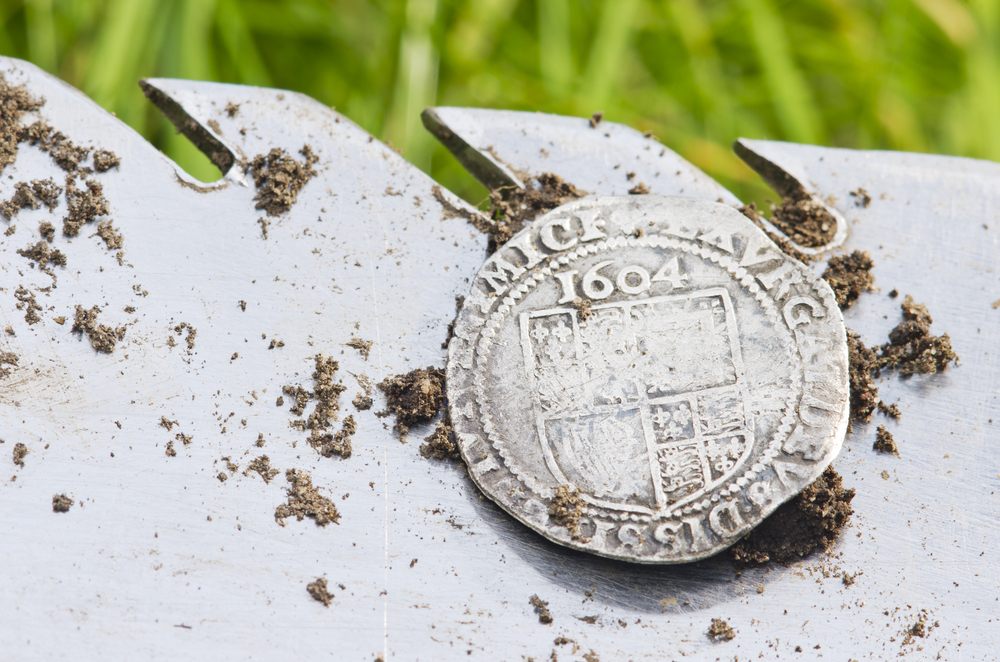
A silver coin discovered with a metal detector. (Photo: Marcis Wos/shutterstock.com)
The story of how Sal Guttuso found his calling sounds like the beginning of an urban legend for nervous parents: He was playing in an abandoned building across the street from his father’s French Quarter restaurant when a van pulled up. The dilapidated structure usually attracted vagrants, so the van presented a tantalizing deviation from the norm, especially when two men armed with curious equipment and big headphones jumped out. Guttuso followed them.
“They didn’t shoo me off,” he says. In fact, one called him over and pointed to a place in the ground that had drawn his interest. As Guttuso watched, the man dug down into the earth until he found what he was looking for. He extracted a circa-1800s silver dollar from the hole, and then two more.
The man had literally dug up treasure right in front of him.

One of Sal Guttuso’s detecting groups in action. (Photo: Sal Guttuso)
“Now, looking back on that, I have often wondered if that old boy was just playing a trick on me to get me interested, to get me hooked,” says Guttuso. “Regardless, the end result was the same—I had to have a metal detector.” Now 42, metal detecting has been his “exclusive passion, addiction, hobby, whatever you want to call it”.
It’s his career, as well. Guttuso and his wife Ashley run History Hunts, a metal detector tour company for adventurous treasure hunters.
A quick crash course in metal detecting: Such machines—in the simplest terms—harness magnetic fields to locate just about anything metallic buried in the earth, from landmines to ancient coins to (the extremely common) aluminum can pull tabs. Metal detectors were used as early as the 19th century and today’s versions are lightweight and offer modern details such as microchip technology and wireless capabilities.
A typical handheld metal detector looks like a stick with a metal donut on the end. The user walks slowly, sweeping (or “swinging”) their detector across the ground, watching an indicator needle, digital display or listening to headphones (or both) which transmit pings, buzzes and beeps back to them when they pass over a metal object. To the uninitiated, it can look like someone trying to vacuum the planet while listening to some tunes.
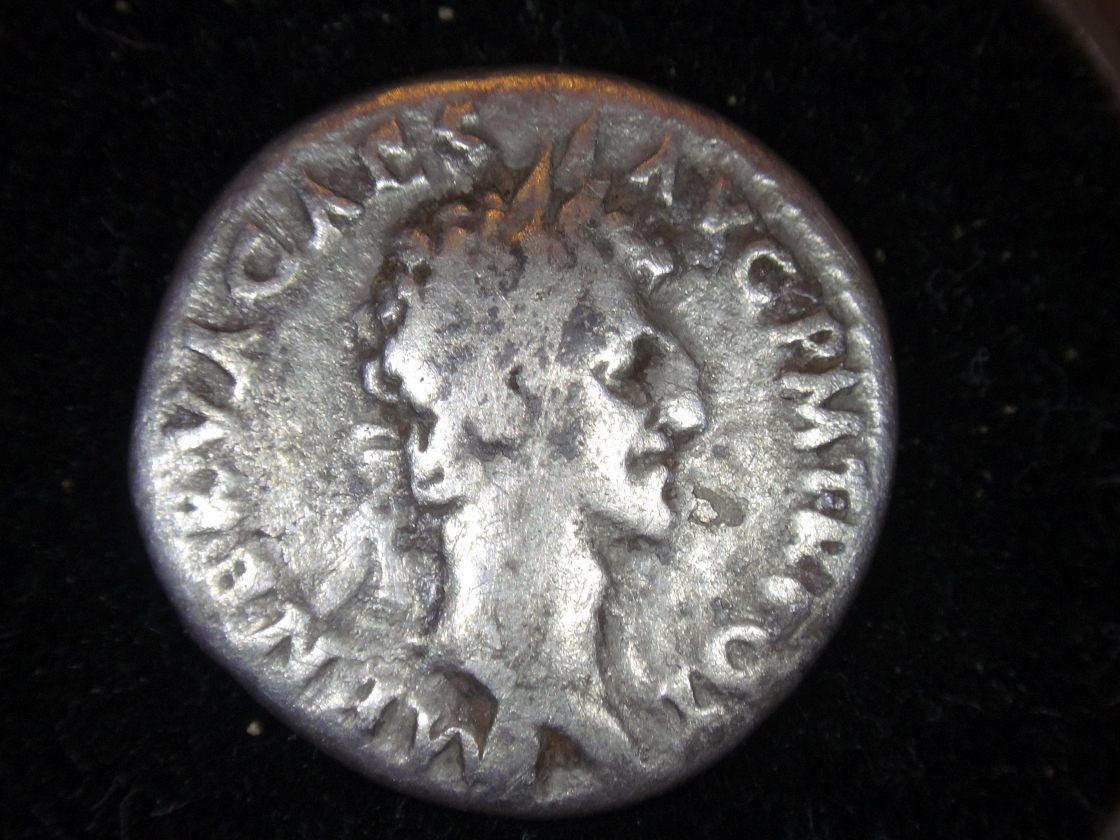
A find from one of Sal’s metal detecting trips: a 94AD Roman Silver Denarius. (Photo: Sal Guttuso)
In recent years, metal detecting has hit a kind of pop cultural sweet spot: The National Geographic Channel produces a reality show called Diggers and the BBC comedy The Detectorists, which follows the exploits of a fictional metal detecting club, has scored critical acclaim. Enthusiasts can indulge in punny t-shirts (“I dig booty”) or groove to 13 songs about metal detecting by Nashville singer Whit Hill (album name: “I Dug It up”.) Even former Rolling Stones bassist Bill Wyman has caught the bug and sells a signature metal detector. (It literally has his signature emblazoned across the front panel.)
Detectors frequently post videos of their hunts and finds on YouTube. This was how Guttuso got noticed; his videos that earned him a following among fellow hunters, who asked him to take them out detecting. It wasn’t long before he sensed an opportunity, left his fulltime job at a big drug company and started History Hunts in 2007. In addition to leading metal detecting tours in near his rural Virginia home, he has taken groups shipwreck detecting in Florida, gold prospecting in Nevada and relic and coin-hunting all over the southern U.S. He also leads international trips to Essex County, England.
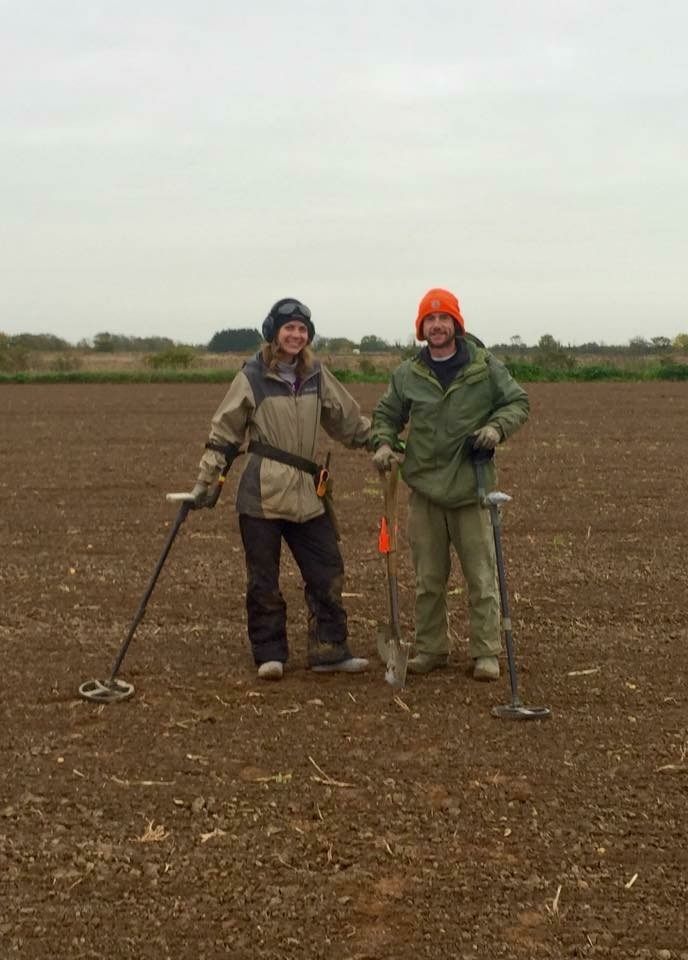
Sal with his wife and business partner, Ashley. (Photo: Sal Guttuso)
Guttuso’s tours are small groups of around six people. His customers are typically die-hard detectorists, not “coinshooters”—casual hunters content to go for a leisurely walk and scoop up loose change. Some of Guttuso’s “dirt fishers” (as hobbyists are sometimes called) save all year to go on one of his trips to hotspots where metal relics abound. Not that finds come easy—they have tromped through rain in England and suited up in long johns to brave bitter cold Louisiana mornings. Some days can be long and boring; you wonder if you will ever find anything.
“We refer to that as ‘getting your brains sucked out’,” says Guttuso, “You feel like you’re dead to the world at the end of the day and you’re wondering if your metal detector even works anymore because you haven’t heard it beep in so long.”
“Brain sucking” isn’t exactly brochure fodder, but there’s a pretty side, too. Guttuso recalls days of combing rustic English farmland, medieval churches looming in the background and warm, sunny walks through former Civil War battle sites.
“You’re on this big, ploughed tobacco field, the sun’s out, the birds are chirping, there’s wildlife. It’s a very therapeutic thing,” says Guttuso.
And of course, the walk is a means to an end: Everyone has followed Guttuso to a destination hoping to come away with something special. Guttuso, and the bulk of his clientele, are rabid history buffs who can’t be satiated with a Ken Burns documentary. They will spend hours combing a field to go home with an actual Civil War bullet or Roman coin.
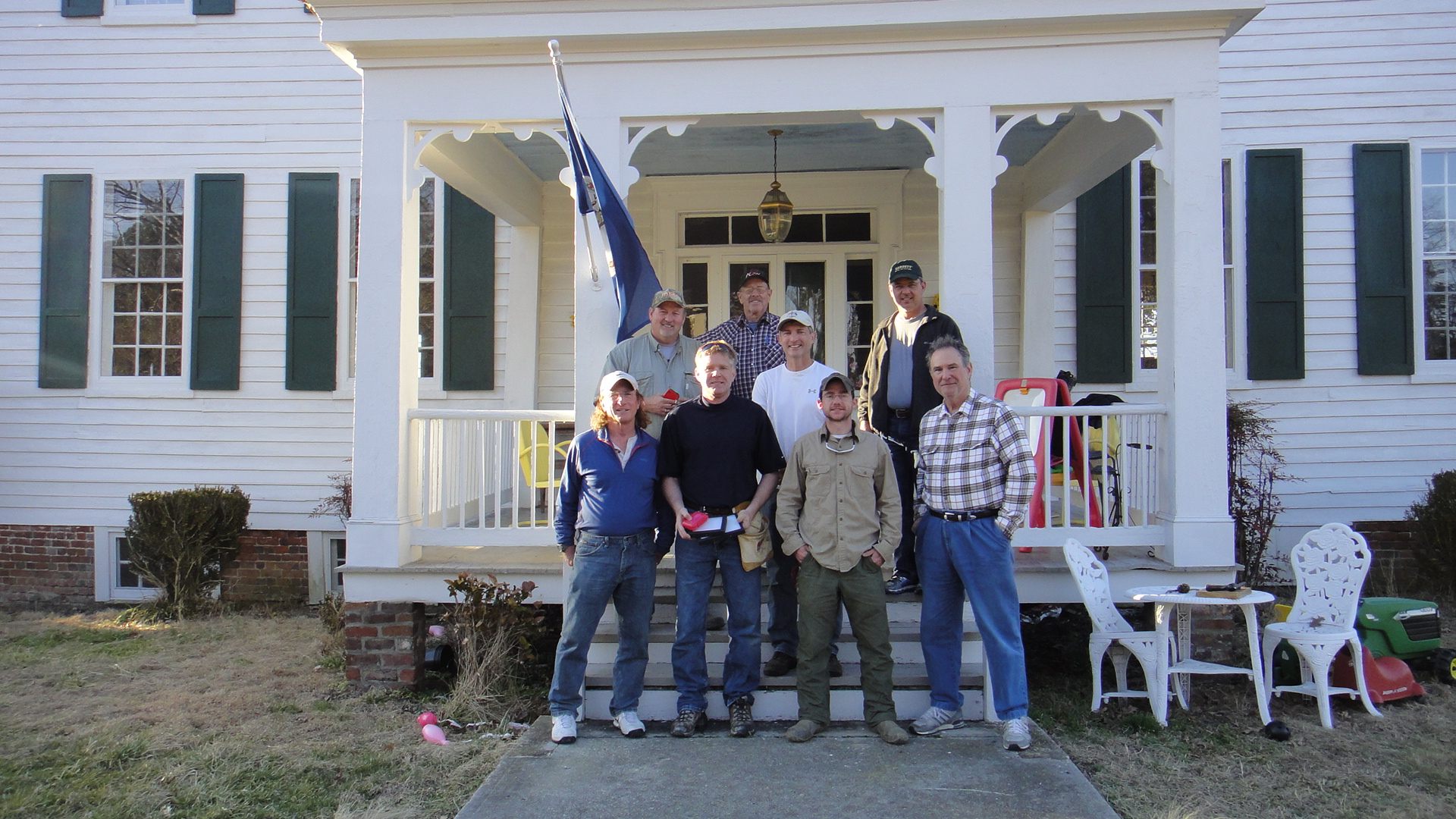
A photo of one of Sal’s History Hunts tours. (Photo: Sal Guttuso)
And his tours have turned up some rare finds, particularly in England, where the group has uncovered coins dating as far back as 500 A.D. and a medieval statue of John the Baptist.
“I do have grown people cry when they find something, I’ll have you know,” says Guttuso. “That’s how emotional this stuff can be.”
Not that the hobby isn’t without detractors. Critics oppose metal detecting hobbyists for fear they will pilfer or harm historic sites. The National Geographic reality show was called out by Montana’s state archeologist for failing to request permission to dig at a historic site. Guttuso understands the concern, but feels such fears are overblown, since it’s unlikely law-abiding detectors would have access to sensitive spots. Not that he hasn’t clocked his share of bad behavior.
“There are a few groups that give it a bad name. They trespass on property in England, they call them ‘nighthawkers’,” says Guttuso. “They leave holes in the ground. In America they trespass on Civil War battlefields. There’s even a story about a guy digging up Civil War graves to try and pull all the accouterments off the soldiers.”
Guttuso works with private property owners to organize his hunts and enforces local law. In England, hunters are required to report potentially significant finds, and the British Museum has the first right of refusal. That John the Baptist statue that one of Guttuso’s clients found? It never left home; the museum snapped it up and reimbursed the finder. Guttuso and his patrons also sometimes donate finds to local museums.
You have to love the hunt itself because the score can be elusive. Guttuso related a story of a particularly fruitful hunt near a former hospital site where his group uncovered four Civil War belt buckles in rapid succession. Suddenly, Guttuso also got a signal on his detector that sounded just like those that had heralded the first four finds.
“I’m videotaping, I’m so excited,” he says. “And you know what? At a foot down, it was a flattened out Vienna sausage can. So that’s just the way it goes.”


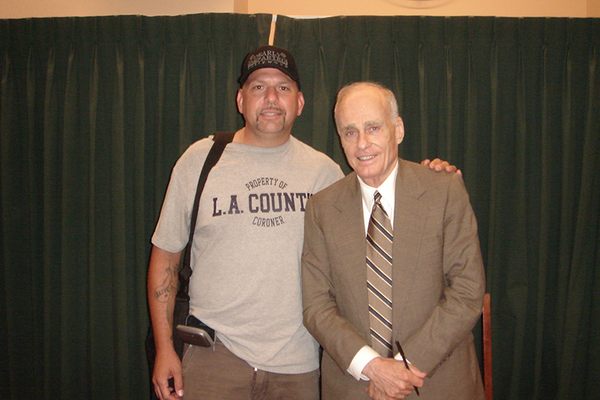




Follow us on Twitter to get the latest on the world's hidden wonders.
Like us on Facebook to get the latest on the world's hidden wonders.
Follow us on Twitter Like us on Facebook